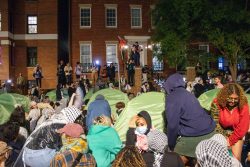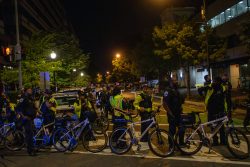Last February, Georgetown University’s Initiative on Diversity and Inclusiveness’s Working Group on Academics released a recommendation calling for the implementation of a diversity course requirement in the Georgetown core undergraduate curriculum. Though the group had anticipated the requirement beginning in the 2011-2012 academic year, professors and faculty at Georgetown are still divided on whether the course is a good idea, making the plan’s future uncertain.
University President John DeGioia referenced the inherent difficulties in implementing a diversity requirement in his bi-annual interview with student publications in September. DeGioia said that the academic life developments have moved slower than the admissions and student life groups have. “When we start working on curricular issues, the time horizon is much longer because it does require such a depth of engagement of our faculty,” he said.
The Initiative on Diversity and Inclusiveness grew out of the Student Commission for Unity, founded by Brian Kesten (COL ‘10) as an “initiative to deter instances of discrimination, climates of bigotry on campus… and create opportunities for students to learn from each other from an equal, mutual standpoint” he told Vox Populi, the Voice’s blog, in January 2009. The group became the Diversity and Inclusive Initiative in September 2010.
Three working groups comprise the initiative: the Working Group on Admissions and Recruitment, the Working Group on Student Life, and the Working Group on Academics. The academic working group primarily seeks to foster cross-cultural understanding through the classroom and curriculum. The group suggested the formation of a Main Campus Diversity Requirement Committee, which will determine courses that fulfill the diversity requirement.
Leslie Hinkson, an assistant professor in the sociology department, expressed concern over Georgetown’s criteria for determining diversity requirement classes.
“The requirements is only as good as the requirement [classes] themselves,” she said. “Almost every course on campus qualifies. If the requirement is made in part for increased opportunities to engage in dialogue with people from different backgrounds and critical thinking, you need more stringent criteria.”
According to a Vox Populi post from August 15, 2010, the academic working group had already identified 140 existing classes in various departments at Georgetown that could count towards this requirement.
Marilyn McMorrow, a visiting assistant professor in the School of Foreign Service, disagreed with Hinkson’s assessment. She likes the fact that the requirement easily fit into a student’s overall curriculum, as it stretches across many disciplines, deeming the courses necessary “for the kinds of communities [students] are entering.”
“I particularly like the idea that they wouldn’t be a sort of diversity syllabus that every student would have to take,” she said. “We could do a better job of addressing very tough political and social issues when we build the subject matter right into the courses rather than addressing it as a separate phenomenon,” McMorrow said.
Hinkson doesn’t believe the diversity requirement can change campus culture. She thinks that in Georgetown’s current climate, a requirement would be more of a detriment to attitudes about diversity.
“If we have a university culture in which people believe that having a Latin American or African American studies program is just as critical as having a program on Africa or Asia, it would make it a lot easier,” she said.
Diversity requirements have been implemented at Cornell University, but only at one of its undergraduate schools (the College of Agriculture and Life Sciences), a fact that is indicative of the complexity of making curricular changes at any university. Thomas Hirschl, a professor of development sociology at Cornell, said the success of Cornell’s “Human Diversity” course is due to the “more progressive” nature of the CALS.
“It is particularly pertinent in that college,” said Hirschl, explaining how CALS disciplines fit organically with those that fulfill the Human Diversity requirement. “The requirement does its job, [but it may be] more valuable for the mainstream students rather than those who are from different ethnic backgrounds.”
Even if a diversity requirement is implemented at Georgetown, it’s unclear if current attitudes toward diversity on campus would change.
“I think that the people pushing the diversity requirement think that it will help change the culture at Georgetown, that [students] will embrace the idea of diversity more and that just having it will change the culture,” Hinkson said. “I’m not too sure. I think a little more work will have to be done.”




